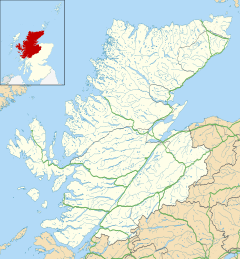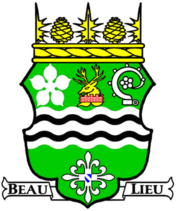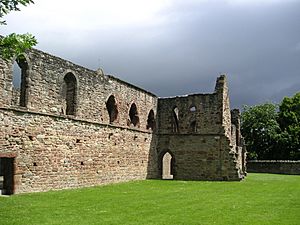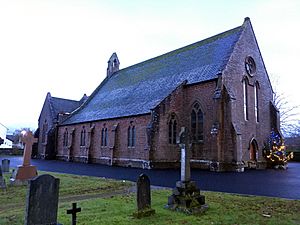Beauly facts for kids
Quick facts for kids Beauly
|
|
|---|---|
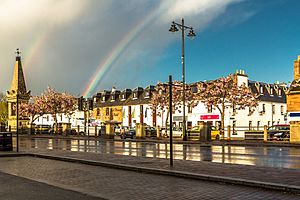 Beauly Square |
|
| Population | 1,400 (2020) |
| OS grid reference | NH525465 |
| Council area | |
| Lieutenancy area | |
| Country | Scotland |
| Sovereign state | United Kingdom |
| Post town | Beauly |
| Postcode district | IV4 |
| Dialling code | 01463 |
| Police | Northern |
| Fire | Highlands and Islands |
| Ambulance | Scottish |
| EU Parliament | Scotland |
| UK Parliament |
|
| Scottish Parliament | |
Beauly (pronounced "BEW-lee") is a charming village in the Highland area of Scotland. Its name comes from the French words "beau lieu," which means "beautiful place." You can find Beauly on the River Beauly, about 12 kilometers (7.5 miles) west of Inverness. It's also located along the Far North railway line.
The land around Beauly is very good for farming. In the past, a lot of corn was grown here. More recently, people have successfully grown fruit. The village used to trade in things like coal, wood, lime, grain, and fish.
Contents
Discovering Beauly's Past
Beauly's Early Days
Beauly is home to the Beauly Priory. This was a special church called the Priory Church of the Blessed Virgin and John the Baptist. It was built in 1230 by John Byset for a group of monks called Valliscaulians. After a big change in Scotland called the Reformation, the buildings (except for the church, which is now a ruin) were taken over by Lord Lovat.
There's a local story that Mary, Queen of Scots, once visited Beauly. She supposedly looked around and said, "Ç'est un beau lieu," meaning "This is a beautiful place!" This is how the village is said to have gotten its name. Queen Mary likely visited Beauly Priory around 1564. She was traveling through Scotland, and it's thought she passed through Beauly on her way to Dingwall.
Beauly is also where Lovat Castle once stood. This castle used to belong to the Bissets family. Later, James VI gave it to Hugh Fraser, 5th Lord Lovat. The castle was eventually taken down.
Beauly's Recent History
In 1994, Simon Fraser, 15th Lord Lovat sold Beaufort Castle to Ann Gloag. She is a director of the Stagecoach Group. This sale helped to pay off debts.
The Beauly railway station was first built in 1862. It closed in 1960 but was fixed up and reopened in 2002.
In 2010, the Scottish government approved plans for a new power line. This line starts in Beauly and goes all the way to Denny, Falkirk. It's a big project designed to carry electricity from wind farms on the Western Isles. The line is about 220 kilometers (137 miles) long. It uses about 600 pylons, which are tall towers, ranging from 42 to 65 meters (138 to 213 feet) high. The first part of this power line was turned on in July 2013.
The number of people living in Beauly has grown over the years:
- 1,126 people in 1991
- 1,283 people in 2001
- 1,365 people in 2011
How Beauly is Governed
Beauly is part of the Aird and Loch Ness Ward. This ward is part of the Highland Council, which helps manage the local area.
Places to Visit in Beauly
Beaufort Castle
About 3 kilometers (2 miles) south of Beauly is Beaufort Castle. This is the main home of the Lovats family. It's a modern house built in the Scottish baronial style. The castle stands where an older fort used to be. That fort was attacked in 1303 by Edward I. Over time, several castles were built and then replaced on this spot. One of them, Castle Dounie, was burned by Oliver Cromwell's forces in 1650. It was destroyed again in 1746 by the army of Prince William, Duke of Cumberland, during the Jacobite Rising. Simon Fraser, 11th Lord Lovat, saw his castle burning from a nearby hill. He then hid in the Highlands before he was captured.
Beauly Priory
The large ruins of the abbey church of Beauly Priory are a great place to explore. You can see old tombs there, especially those of the Mackenzie family. Historic Scotland takes care of these ruins.
Local Churches
There is a large red sandstone church on the north side of the village. It was designed by an architect named Joseph Aloysius Hansom during the Victorian era. The church was paid for by Thomas, 12th Lord Fraser of Lovat. It opened for worship on November 13, 1864. It was named St Mary's and was the first proper Catholic church built in Beauly.
In the church grounds, you can find a special stone called a Bullaun. It's also known as (Scottish Gaelic: Clach a Bhaistidh), which means "the stone of the baptism." This stone was used a long time ago during the Penal Laws. At that time, three Jesuit priests had to hide. They used this stone to perform baptisms in a secret cave. Later, the stone was moved to St. Mary and St. Bean's Church to keep it safe. It is still valued as a special item from that time.
Southeast of Beauly is the Church of Kirkhill, Highland. This church holds the burial place of the Lovats family. It also has graves for some groups, or septs, of the Mackenzie family, including those from Seaforth and Mackenzies of Gairloch.
Sports in Beauly
Beauly is well-known for its shinty team, the Beauly Shinty Club. Shinty is a traditional Scottish sport similar to hockey. The team has won the Camanachd Cup three times and has even been World Champions once!
Famous People from Beauly
- Simon Fraser, 15th Lord Lovat: He was the 25th Chief of the Clan Fraser of Lovat. He was also a very important British Commando during the Second World War.
 | Toni Morrison |
 | Barack Obama |
 | Martin Luther King Jr. |
 | Ralph Bunche |


